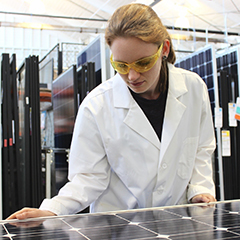· In an industry too young to have long-term field data on reliability, DNV GL’s comprehensive lab study goes beyond standard testing to bridge knowledge gap, help minimize risk for solar investors
· Latest edition of report provides data on module performance over time
with rankings of manufacturers of solar PV panels from around the world
· Testing finds disparity in performance among global brands: no correlation found between value and price or reliability and region of manufacturer
BURLINGTON, Mass., US (19 May 2016) – DNV GL, the world’s largest resource of certification and energy expertise, has released the 2016 PV Module Reliability Scorecard, its second edition of a rigorous review of PV module performance. The study aims to address the lack of publicly available long-term data on reliability.
“While a 25-year performance warranty is standard in the industry, most PV modules have actually been in use less than five years, so there is a real lack of data on how equipment holds up over time,” said DNV GL’s Jenya Meydbray, the study’s lead author. “Since the first edition of the Scorecard in 2014, its findings have become a critical resource to an industry looking to understand risk.”
The Scorecard is intended to serve as a tool to compare module expected reliability and long-term performance qualitatively. The rankings provide a resource for banks, developers and independent power providers with findings to inform prudent investment in PV modules.
· Nate Coleman, VP of Technical Operations for SolarCity, the United States’ biggest residential solar provider, said, “DNV GL is our trusted partner, providing the critical data that we rely on to evaluate equipment and manage our approved vendor lists.”
· Nigel Cockroft, general manager of Jinko Solar USA, said, “Jinko is proud to work with an industry leader like DNV GL to offer third-party validation of our commitment to quality. This is an important part of how we work with customers and project financiers.”
The 2016 Scorecard evaluated nineteen manufacturers, including more than fifty percent of the world’s 10 largest makers of PV modules. All participants in the study are commercially available products that have already demonstrated compliance with required safety standards. DNV GL tested five major factors affecting deterioration and reliability over time: thermal cycling, dynamic mechanical load, damp heat, humidity freeze and PID (potential induced degradation).
Key findings of the 2016 Scorecard
· Many module vendors performed well across all tests. For example, while the IEC pass/fail criteria allows for five percent degradation after 200 thermal cycles, eight tested manufacturers surpassed this pass/fail criteria, showing only three percent degradation after four times the IEC duration (800 thermal cycles).
· Two manufacturers performed in the top group on every test: Kyocera and Phono Solar.
· Approximately 55 to 60 percent of top group modules were manufactured in China. This is roughly equivalent to the ratio of Chinese module participation in the full PV Module Reliability Scorecard. This demonstrates that manufacturing location is not a good proxy for reliability.
The 2016 Solar Module Reliability Scorecard is available as a free download from https://www.dnvgl.com/energy/publications/download/pv-reliability-scorecard-2016.html.
Image: DNV GL’s Alisan Varney inspecting a module for visual defects at the testing laboratory in Berkley, California.
DNV GL
Driven by its purpose of safeguarding life, property and the environment, DNV GL enables organisations to advance the safety and sustainability of their business. DNV GL provides classification and technical assurance along with software and independent expert advisory services to the maritime, oil & gas and energy industries. It also provides certification services to customers across a wide range of industries. DNV GL, whose origins go back to 1864, operates globally in more than 100 countries with its 16,000 professionals dedicated to helping their customers make the world safer, smarter and greener.
In the Energy industry
In DNV GL we unite the strengths of DNV, KEMA, Garrad Hassan, and GL Renewables Certification. DNV GL’s 2,500 energy experts support customers around the globe in delivering a safe, reliable, efficient, and sustainable energy supply. We deliver world-renowned testing, certification and advisory services to the energy value chain including renewables and energy efficiency. Our expertise spans onshore and offshore wind power, solar, conventional generation, transmission and distribution, smart grids, and sustainable energy use, as well as energy markets and regulations. Our testing, certification and advisory services are delivered independent from each other.
Learn more at dnvgl.com/solar-testing.


























